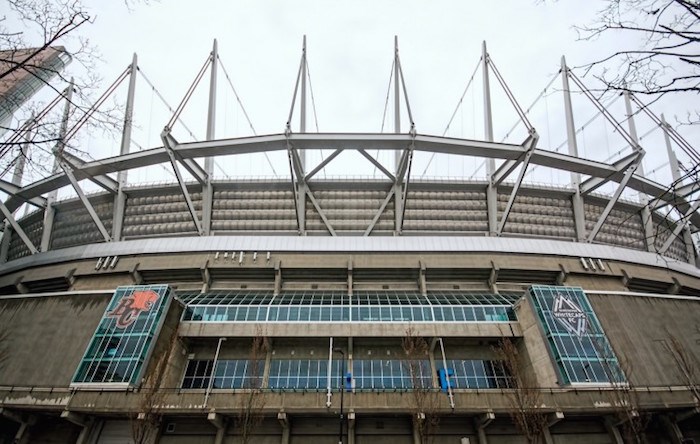Civic and provincial officials met last Nov. 3 with a FIFA delegation in Vancouver to discuss plans and responsibilities for the FIFA World Cup 26.
But a presentation obtained under the freedom of information (FOI) law reveals only vague details about the biggest, most-expensive event in sa国际传媒 since the 2010 Winter Olympics.
A vast majority of the text in the 86-page “Host City Operations Group Meeting” presentation is censored, because Vancouver city hall believes disclosure would harm FIFA. Two sections of the presentation are censored in their entirety, including one with the graphic of a handshake.
But there are hints that, when BC Place Stadium hosts seven matches in 2026, the Lower Mainland faces a repeat of some of the transportation and security restrictions from February 2010.
The agenda for the 9 a.m. to 4:30 p.m. meeting, the last of FIFA’s tour of the 16 host cities, included discussion about the host city footprint, stadium and training site operations, transportation and traffic management, airport operations, and safety and security.
What is visible from the transportation slides: a map from Qatar 2022, showing road closures for the duration of the event and during match days, with exceptions for emergency vehicles and special lanes for very, very important persons. Another page shows photographs of FIFA and sponsor-branded vehicles and motor coaches.
The most-revealing section may be about the FIFA Fan Festival. “Providing a live broadcast of all matches,” the document states. It shows a photo from Russia 2018, where attendance reached a high of 166,000, and Qatar 2022, which topped out at 57,000. The $104.3-million PNE Amphitheatre is expected to open in spring 2026 and host daily watch parties for the duration of the tournament.
The Nov. 3 list of attendees counted 29 staff from BC Place, 18 from City of Vancouver, three from the sa国际传媒 government’s marquee sports events office, two from Vancouver International Airport and at least one from the Vancouver Police Department.
Seven names and their affiliations were withheld due to the security exemption from the FOI law.
Vancouver representatives included host city manager Doug Campbell, host city operations manager Taunya Geelhoed and Rosemary Hagiwara, the acting city clerk who is now director of coordination and alignment, according to the city directory.
Chief tournament officers Manolo Zubiria and Peter Montopoli led the 37-member FIFA delegation. Zubiria is director of competitions at Zurich-headquartered FIFA. Montopoli, the former Canadian Soccer Association general secretary, is the top executive for the matches in Toronto and Vancouver. They were accompanied by FIFA experts in operations, transportation, venue management, hospitality, information technology, marketing, media, stadium and infrastructure, ticketing and hospitality and TV production.
Hagiwara coordinated a social reception at the Parq casino’s D/6 bar and lounge while the city’s Indigenous relations director, Michelle Bryant-Gravelle, organized a “reconciliation education” presentation in the Goalpost and Balcony lounges at the stadium.
FIFA named Vancouver a host city in June 2022. The 48-nation tournament in the U.S., sa国际传媒 and Mexico was expanded to 104 matches. BC Place had originally expected five matches, but will now host seven between June 13 and July 7, 2026.
The City of Vancouver is responsible for the $230-million hosting budget announced in early 2023. The province granted the city power to levy a 2.5 per cent accommodation tax until 2030.
BC Place will undergo renovations and there will also be extra costs for security, but the NDP government under Premier David Eby has not announced the budget.
During question period on Wednesday, Finance Minister Katrine Conroy scoffed at the suggestion that the province’s $3-billion contingency budget would all go toward FIFA. Conroy then suggested “[the sa国际传媒 United opposition] hate soccer.”
“We will have the numbers soon. We want to get those numbers right,” Conroy said.
In May 2007, Eby worked for the Pivot Legal Society and was one of the editors of the Impact of the Olympics on Community Coalition (IOCC) “Olympic Oversight Interim Report Card.” One of the sections, under “Public expenditure and transparency,” slammed governments and the organizing committee, VANOC, for secrecy.
“The authors are concerned by an absence of budgeting that reflects true costs to the taxpayer at the provincial and municipal levels,” the IOCC report said.
While Seattle city council released its contract with FIFA last August, Vancouver city hall and the provincial government have withheld both the proposal to FIFA and the contract with FIFA. An adjudicator from the Office of the Information and Privacy Commissioner is expected to hold a written inquiry sometime this year.
In 2018, City of Toronto originally estimated hosting 2026 matches at BMO Field would cost only $30 million to $45 million. A Monday report to city council’s executive committee said the July 2022 estimate of $300 million had risen 26 per cent to $380 million..
“The adjustment to cost estimates is based on a variety of factors including: further defined hosting requirements; the announcement of a total of six matches (versus the estimated five), including sa国际传媒’s opening match of the tournament; evaluation of price estimates/vendor quotes; safety and security requirements; and inflationary uncertainty,” the Toronto report said.
The Province of Ontario has conditionally committed up to $97 million, but Toronto is waiting on Ottawa. The federal policy on hosting international sport events caps contributions at 35 per cent of total event costs and a maximum of 50 per cent of the total public sector contribution.




